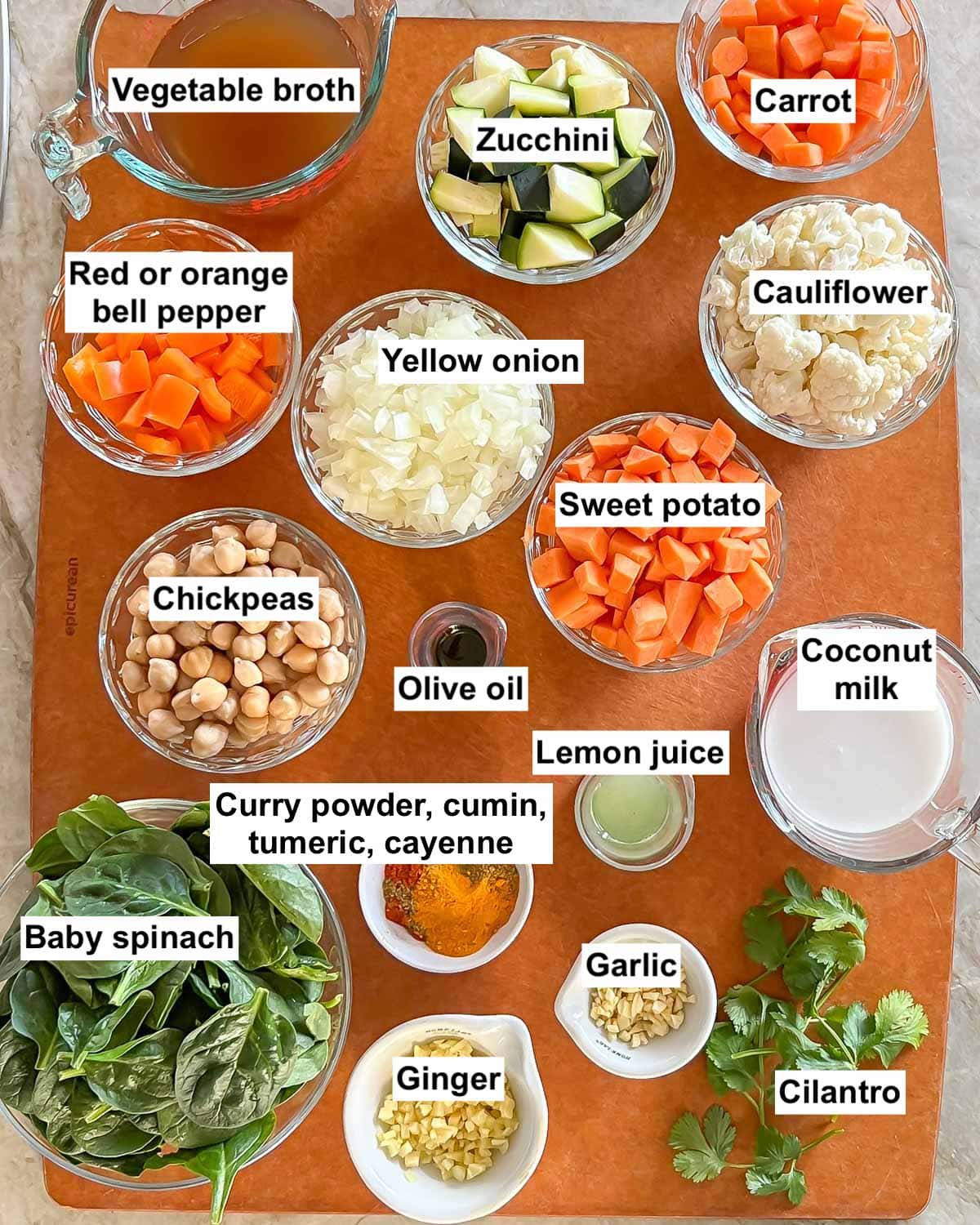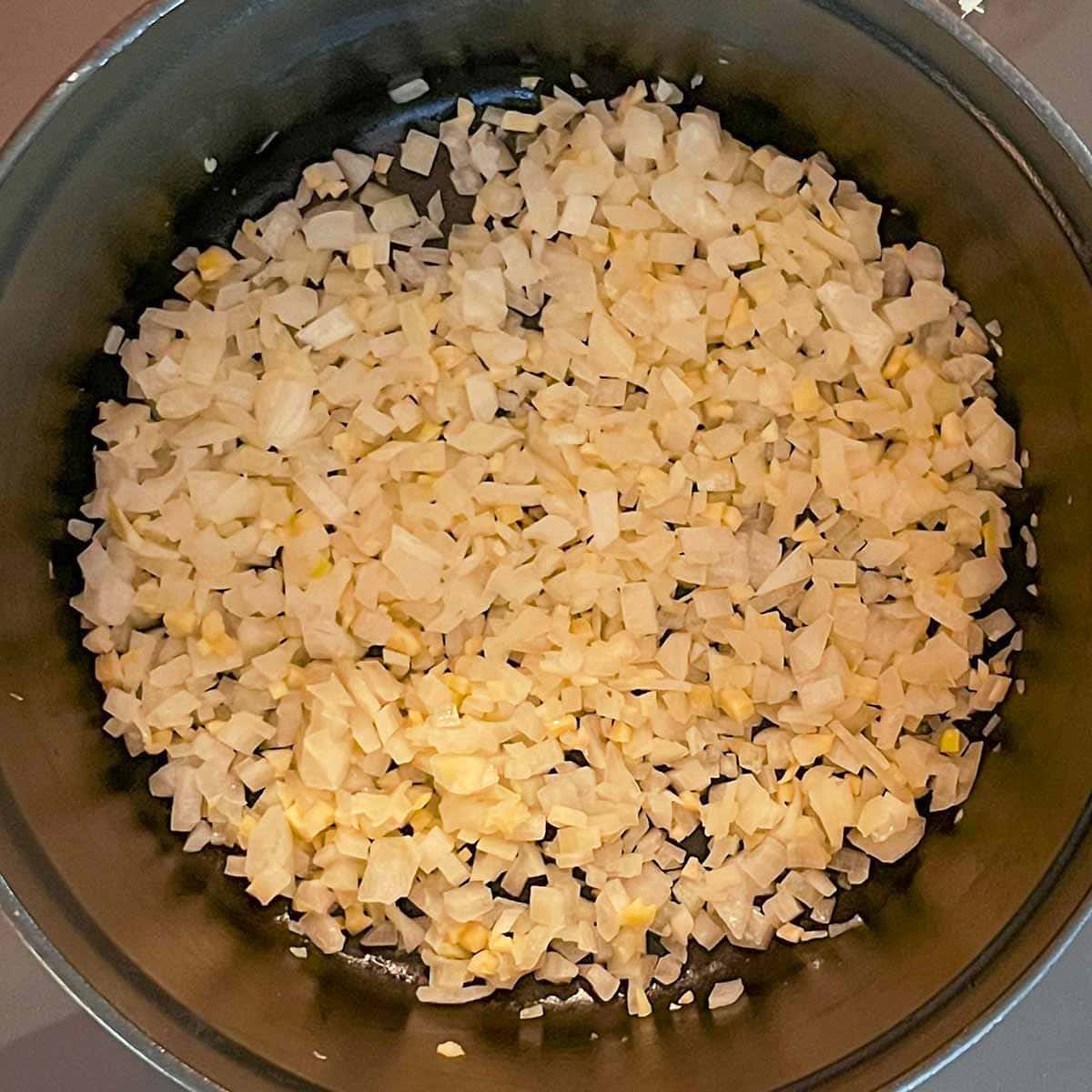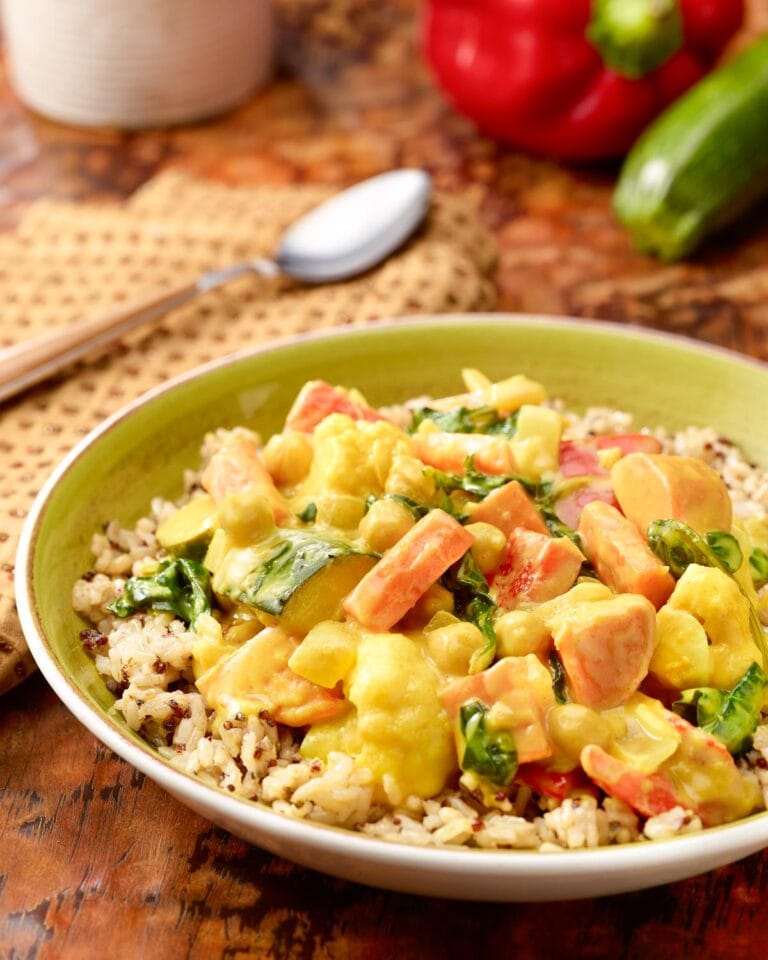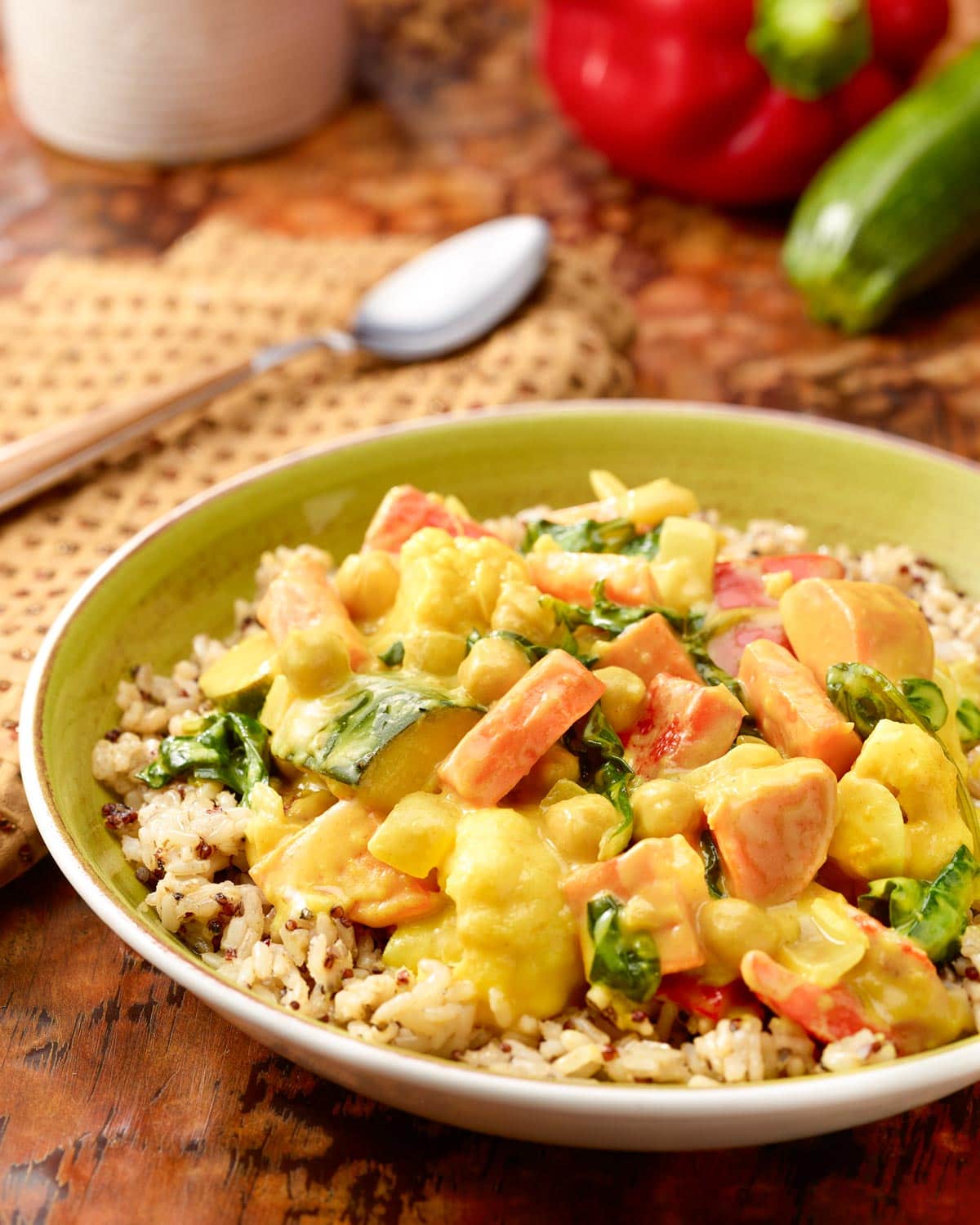Welcome to my kitchen, where a vibrant pot of Mixed Vegetable Curry awaits! Fresh, seasonal vegetables like cauliflower, carrots, zucchini, spinach, and sweet potato star in this dish, bathed in a flavorful Madras curry sauce infused with warm cumin, earthy turmeric, and a touch of cayenne pepper. And, creamy coconut milk adds a touch of richness and balance, making this curry a delightful and comforting meal.
Table of Contents
- Why This Recipe for Vegetable Curry Works
- Ingredients for Mixed Vegetable Curry with Coconut Milk
- Step-by-Step Guide to Preparing This Vegetable Curry Recipe
- Tips for Making Mixed Vegetable Curry
- Serving Suggestions and Accompaniments
- Substitutions and Variations for Mixed Vegetable Curry
- Storage and Reheating
- FAQs about Mixed Vegetable Curry with Coconut Milk
- Other Vegetarian Main Dishes To Try
- Mixed Vegetable Curry with Fresh Vegetables Recipe
Why This Recipe for Vegetable Curry Works
I’ve always loved the warm embrace of a good curry. Two favorites are my Chicken Curry with Coconut Milk and my mom’s Lamb Curry. Over the years, I’ve played around with creating a vegetarian version, experimenting with countless vegetable and spice combinations. Today, I’m sharing my go-to version; I’m especially fond of the combination of curry, ginger, and coconut milk in this recipe.
Here’s why I think you’ll love this Mixed Vegetable Curry:
- Fresh flavors. Our recipe emphasizes using fresh, seasonal vegetables that retain their pronounced flavors, vibrant colors, and a slightly crunchy texture,
- Warm and comforting. The combination of creamy coconut milk and aromatic spices like Madras curry powder and turmeric creates a warm and comforting dish that’s not overly heavy or rich.
- Packed with nutrients. This curry is loaded with essential vitamins, minerals, and fiber thanks to the fresh vegetables and chickpeas, making it a great way to enjoy a satisfying and healthy meal.
- Easy to make. Clear, concise instructions and helpful tips make cooking curry easy for all levels!
- Easily customizable. Feel free to adjust the ingredients to your taste, dietary needs, or what you have on hand. A variety of vegetables work well in this dish.
Ingredients for Mixed Vegetable Curry with Coconut Milk

Here’s what you’ll need to create this mixed veg curry. This list is long, but all these ingredients should be available at local grocery stores (details, including quantities, are in the recipe card below):
- Olive oil
- Yellow onion
- Fresh ginger
- Garlic
- Vegetable broth
- Canned coconut milk (light or regular) – Full-fat coconut milk will yield a richer curry, while light coconut milk will be lighter in calories and fat.
- Curry powder – I recommend Madras
- Ground cumin
- Ground turmeric
- Cayenne pepper (optional)
- Sweet potatoes or butternut squash
- Cauliflower
- Red or orange bell pepper
- Carrot
- Zucchini
- Canned chickpeas (garbanzo beans)
- Fresh baby spinach
- Fresh cilantro (optional)
- Lemon juice
- Kosher salt
- Ground black pepper
For serving: Cooked brown rice, basmati rice, or brown rice-quinoa mixture.

Step-by-Step Guide to Preparing This Vegetable Curry Recipe
Here’s a detailed overview of how to create this Easy Vegetable Curry:
- Wash, peel (as needed), and chop ingredients.
Wash vegetables and pat dry with paper towel. Peel and chop onion, ginger, garlic, sweet potato, and carrot. Core, seed and chop the pepper. Vegetables should be around the same size, 1/2 to 3/4 inch cubes. Cut cauliflower into small florets around the same size as the other vegetables. Cut zucchini lengthwise into quarters (or eighths if thick), then slice crosswise into pieces around the size of the other vegetables – it’s okay if their slightly larger. Chop cilantro, if using. - Sauté onion, ginger, and garlic.
In a 3- to 4-quart Dutch oven, heat the oil over medium-low heat. Add the onion, ginger and garlic; cook, stirring occasionally, for 8 minutes or until onion is soft and beginning to caramelize (will be a light golden brown color).
- Add spices, then broth and coconut milk.
Stir in the curry powder, cumin powder, turmeric, and cayenne; continue cooking, stirring, for 1 to 2 minutes. Stir in the vegetable broth and coconut milk. Bring to a boil, reduce heat, and simmer for 10 minutes.
- Add potato, cauliflower, pepper, carrot, and zucchini.
Stir in the sweet potato, cauliflower, bell pepper, carrot and zucchini. Bring to a boil, reduce heat and simmer, covered, 20 minutes or until the vegetables are tender. - Add chickpeas, spinach, cilantro and lemon.
Stir in the chickpeas, spinach, cilantro and lemon juice; cover and continue cooking until the spinach has wilted and the chickpeas are heated through.
- Adjust seasonings.
Season to taste with salt. Add additional curry powder and/or cayenne pepper if needed. If too spicy, add more lemon juice – the acid will mellow out the spiciness.
Tips for Making Mixed Vegetable Curry
Here are my tips for ensuring your curry comes out perfect every time:
- Chop vegetables evenly. Vegetables should be around the same size, around 1/2 to 3/4 inches. This ensures they cook at approximately the same rate.
- Have all your ingredients prepped and ready (“mis in place”). Doing all the chopping and measuring ahead of time (you can even do it earlier in the day) will make the cooking process smoother and faster.
- Don’t skip sautéing the spices with the onion, garlic, and ginger. This process creates layers of flavor by releasing the spices’ complex aromas and infusing the other ingredients with their essence.
- Adjust the spice level at the end. Spices can vary significantly in strength, depending on how long the jar has been open. Start with the quantities called for in the recipe, then add more at the end as needed.
Serving Suggestions and Accompaniments
Here are a few suggestions on how to serve this delicious Mixed Vegetable Curry:
Buffet or family style:
- Place curry in a large serving bowl and garnish with additional chopped fresh cilantro.
- Serve cooked brown rice, basmati rice, or brown rice-quinoa mixture in a bowl on the side.
- Can also add a basket of warm Indian bread (Naan).
Plated:
- Place around 1/3 cup cooked brown rice, basmati rice, or brown rice-quinoa mixture in a shallow bowl or on a dinner plate.
- Top with vegetable curry.
- Garnish with additional chopped fresh cilantro.
- Pass a basket of warm Indian bread (Naan).

Substitutions and Variations for Mixed Vegetable Curry
As mentioned previously, this delicious curry recipe is extremely versatile and can be modified to suit your tastes, dietary needs, or what you have on hand. Here are a few suggestions for different vegetables and other ingredients:
- Add green beans, green peas, or baby corn.
- Add chopped russet potatoes.
- For a bit more spice, add green chillies – 1 tablespoon chopped jalapeno or serrano pepper.
- Amp up the sauce flavor even more by adding 1/2 teaspoon coriander powder.
- Substitute green bell peppers for the red or orange.
- Substitute broccoli florets for the cauliflower and serve over cauliflower rice.
Storage and Reheating
When making ahead or if you have leftovers, place in an airtight container and refrigerate. They will last for 3 to 4 days.
FAQs about Mixed Vegetable Curry with Coconut Milk
Substituting heavy cream for coconut milk is possible, but I don’t recommend it. Cream will make the curry richer and creamier, and it will lack the subtle, slightly sweet coconut flavor. Alternatively, you could use a different type of plant-based milk, but again, the flavor and texture will be different.
Yes, this vegetable curry recipe is very healthy, as it’s made with fresh vegetables, minimal olive oil, and vegetable broth. In addition, you can opt for low fat coconut milk. Nutritional information is provided at the bottom of the recipe card.
Yes, but they may be less crunchy. Thaw them according to package instructions, drain, and pat dry with paper towel before adding to the curry.
Other Vegetarian Main Dishes To Try
- Quick Pappardelle with Mushrooms and Eggplant
- Vegetable Pot Pie with Puff Pastry
- Quinoa Stuffed Bell Peppers
- Garden Vegetable Quiche
- Vegetarian Pot Pie
- Butternut Squash Gratin
- Broccoli, Mushroom, Spinach and Cheese Pasta
- Convent Pie (Cheese Soufflé with Pasta)

Mixed Vegetable Curry with Fresh Vegetables
Fresh, seasonal vegetables like cauliflower, carrots, zucchini, spinach, and sweet potato star in this dish, bathed in a flavorful Madras curry sauce infused with warm cumin, earthy turmeric, and a touch of cayenne pepper. Creamy coconut milk adds a touch of richness and balance, making this curry a delightful and comforting meal. Though crafting the perfect curry might seem daunting, fear not! My step-by-step instructions (with photos) and handy cooking tips will guide you through the process with ease.
- Prep Time: 45 minutes (including chopping)
- Cook Time: 45 minutes
- Total Time: 1 hour 30 minutes
- Yield: 4 to 5 servings 1x
- Diet: Vegetarian
Ingredients
- 1 1/2 teaspoons olive oil
- 1/2 large yellow onion, chopped
- 1 tablespoons chopped fresh ginger
- 1/2 teaspoon chopped garlic
- 3/4 cup vegetable broth
- 1/2 cup coconut milk (light or regular)
- 1 1/2 teaspoons curry powder
- 3/4 teaspoon ground cumin
- 3/8 teaspoon ground turmeric
- 1/8 teaspoon cayenne pepper (optional)
- 1 cup chopped sweet potato or butternut squash
- 1 cup chopped cauliflower (into small florets)
- 1/2 cup chopped red bell pepper
- 1/2 cup chopped carrot
- 1/2 medium zucchini, chopped
- 1/2 (15-ounce) can chickpeas (garbanzo beans), drained and rinsed
- 2 to 2 1/2 cups (about 6 to 7 ounces) fresh baby spinach
- 2 tablespoons chopped fresh cilantro, plus more for garnish
- 1 tablespoon lemon juice
- Salt, to taste
- Freshly ground black pepper, to taste
- For serving: 1 1/2 cups cooked brown rice or brown rice-quinoa mixture
Instructions
- In a 3- to 4-quart Dutch oven, heat the oil over medium-low heat. Add the onion, ginger and garlic; cook, stirring occasionally, for 8 minutes or until onion is soft and beginning to caramelize (will be a light brown color).
- Stir in the curry powder, cumin, turmeric, and cayenne; continue cooking, stirring, for 1 to 2 minutes. Stir in the vegetable broth and coconut milk. Bring to a boil, reduce heat, and simmer for 10 minutes.
- Stir in the sweet potato (or butternut squash), cauliflower, bell pepper, carrot and zucchini. Bring to a boil, reduce heat and simmer, covered, 20 minutes or until all the vegetables are tender.
- Stir in the chickpeas, spinach, cilantro and lemon juice; cover and continue cooking until the spinach has wilted and the chickpeas are heated through.
- Season to taste with salt (may need a fair amount depending on how salty your vegetable broth is). Add additional curry powder and/or cayenne pepper if needed. If too spicy, add more lemon juice – the acid will mellow out the spiciness.
Notes
Chop the vegetables evenly: Vegetables should be around the same size, around 1/2 to 3/4 inches.
Make ahead: Curry can be prepared up to 24 hours in advance, placed in an airtight container, and refrigerated. Reheat, covered, over medium heat.
- Category: Main dish
- Method: Cooktop
- Cuisine: Indian
Nutrition
- Serving Size: 1/4 of recipe
- Calories: 263
- Sugar: 4.9 g
- Sodium: 461 mg
- Fat: 9.9 g
- Saturated Fat: 5.9 g
- Carbohydrates: 39 g
- Fiber: 7.4 g
- Protein: 7.2 g
- Cholesterol: 0 mg





